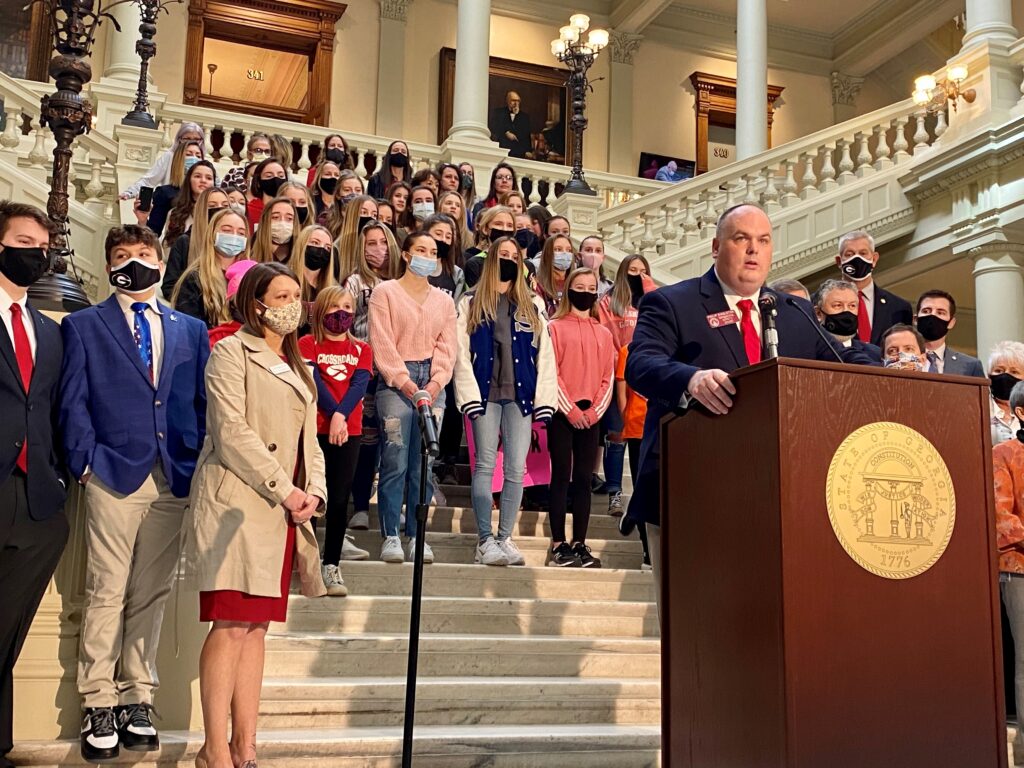
ATLANTA – A trio of bills aimed at separating Georgia school sports teams between children assigned male or female at birth have cropped up in the General Assembly, sparking backlash from LGBTQ advocates who view the measures as discriminatory toward transgender persons.
One measure by state Rep. Philip Singleton, R-Sharpsburg, has taken the brunt of the focus for its proposal to ban “biological boys” from playing on school sports teams with “biological girls,” as well as permit lawsuits against schools that defy splitting up different-gendered student athletes.
Another bill, by state Rep. Rick Jasperse, R-Jasper, would require similar school-sports separations as Singleton’s measure, likewise legally defining “gender” as “a person’s biological sex at birth” in state law.
It would also require a panel of three doctors to review information on a “student’s reproductive organs, genetic makeup and other medically relevant factors” if parents seek to waive having their kids comply with the male-female sports rules.
A third measure filed Thursday by state Sen. Marty Harbin, R-Tyrone, would also separate high school athletes based on gender, defined as “biological sex.” It would further require Georgia public colleges and universities to do the same by making “all determinations based on sex and not on gender.”
LGBTQ advocates have long challenged moves to conflate gender with sex, citing research that disputes equating a person’s sexual identity with their sex organs. They argue Singleton’s bill, the only one of the three to face a General Assembly hearing so far, could ostracize Georgia’s transgender students.
“We know from our country’s history that separate but equal is never equal,” said Heidi Miracle, parent of a transgender daughter and the community engagement director for the LGBTQ advocacy nonprofit PFLAG’s Woodstock chapter.
“Transgender youth need to fit in, to be accepted,” Miracle said at a recent hearing on Singleton’s bill. “To force them to be on a team with a gender identity that does not match their own and against their will would be devastating.”
Singleton, who introduced a similar measure last year, has dismissed criticism that his bill targets transgender youths in Georgia, arguing its intent is to promote fairness in female high-school sports while stressing that “biological differences at birth” give male athletes a competitive advantage.
“This bill is not about transgender athletes,” Singleton said. “This bill is about protecting girls’ sports. There’s noise that’s trying to detract from that…. We’re trying to prevent people from being hurt in Georgia.”
Opponents of Singleton’s bill have also warned it could prompt popular sporting events like the NCAA basketball tournament and socially conscious business groups to abandon Georgia, threatening economic damage similar to what North Carolina faced for passing a bill to restrict bathroom use according to gender in 2016.
“When LGBTQ people don’t feel welcome at work or in the community, they’re less likely to stay,” said Chris Lugo, executive director of OUT Georgia Business Alliance. “Employee turnover is a drag on our state economy and business competitiveness.”
Supporters have rallied behind Singleton’s measure, arguing male athletes have biological advantages over female athletes and should not be allowed to potentially create unfair playing fields. Harbin’s bill, likewise, is co-sponsored by more than half of the state Senate’s Republican members.
“This is an actual pro-women legislation,” Rep. Sheri Gilligan, R-Cumming, said about Singleton’s bill. “And there is nothing discriminatory about laws that protect equal opportunities for females and female athletes.”
Another measure, sponsored by Rep. Ginny Ehrhart, R-Marietta, would forbid Georgia doctors from performing sex-reassignment surgeries on anyone younger than 18, with felony charges resulting from ignoring the proposed ban.
The Georgia Republican-backed bills on sex and gender follow President Joe Biden’s Jan. 20 order to boost federal protections against gender identity and sexual orientation discrimination, aiming to relieve kids from “worrying about whether they will be denied access to the restroom, the locker room or school sports.”
Biden’s order was hailed by LGBTQ advocacy groups including the Human Rights Campaign, which said the protections “will have a real and practical impact on the day-to-day lives of the approximately 11 million LGBTQ adults and millions more LGBTQ youth in the United States.”
Other groups have panned Biden’s order, calling it a step too far that could harm female athletes. The nonprofit Independent Women’s Voice, which backs Singleton’s bill, said the order “jeopardizes the future of female sports and may even place girls and women in physical danger.”
Singleton’s bill and others also come as the U.S. House of Representatives passed the Equality Act on Thursday, which would bolster protections against gender identity and sexual orientation discrimination in jobs, housing and public areas like restaurants.
All six of Georgia’s Democratic U.S. House members voted in favor of the Equality Act. All eight Republicans voted against it. The measure now heads to the U.S. Senate.
